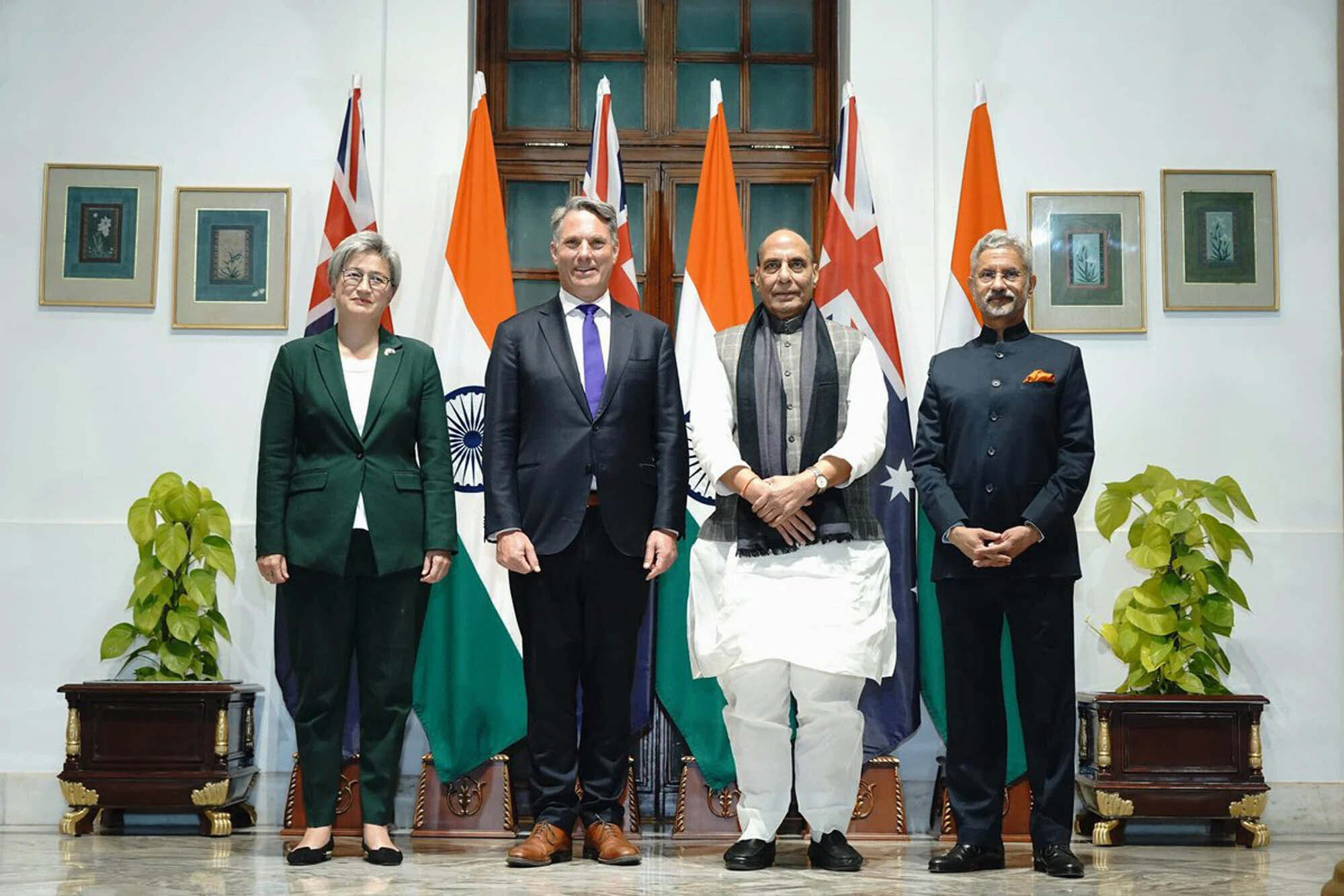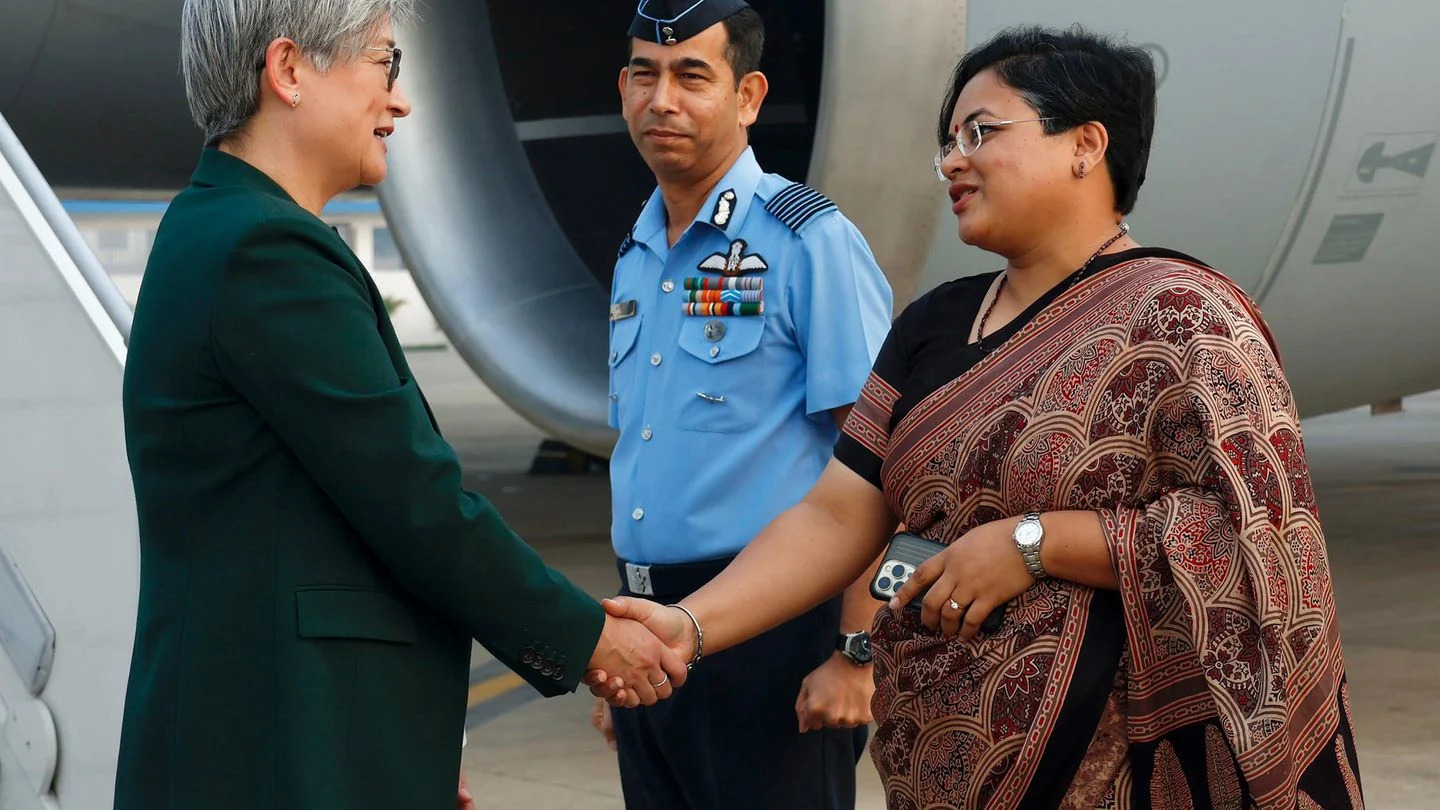India and Australia on Tuesday said they were committed to boosting economic and strategic ties, as their top diplomats shared concerns over China, regional security and the Israel-Hamas war.
Indian External Affairs Ministry spokesperson Arindam Bagchi on the X-platform formerly known as Twitter, from left, Australian Foreign Minister Penny Wong, Australian Defence Minister Richard Marles, Indian Defense Minister Rajnath Singh and India's Minister of External Affairs Subramanyam Jaishankar pose for photographs during the second India-Australia 2+2 Dialogue in New Delhi, India, Monday, Nov.20, 2023.
Indian Foreign Minister Subrahmanyam Jaishankar met with his Australian counterpart Penny Wong a day after the two along with the countries’ defense chiefs held talks in New Delhi.
Jaishankar said he and Wong took stock of their growing ties in trade and defense, and there was “a real momentum" in their relationship.
The Indo-Pacific was a key priority for both countries, they said. Both Jaishankar and Wong said their nations are committed to a free, inclusive and rules-based Indo-Pacific region.
While neither of them named China, Australian Deputy Prime Minister and Defense Minister Richard Marles on Monday said China remained a top concern for India and Australia.
“For both of us, China is our biggest trading partner. For both of us, China is our biggest security anxiety,” Marles said.
After Canberra angered Beijing in 2018 by banning Chinese telecommunications giant Huawei from rolling out the country's 5G, economic ties have improved since Australia voted in a center-left government in 2022. But they continue to compete over influence in the Asia-Pacific.
For India, a yearslong military standoff along the shared but disputed border with China has exacerbated tensions and brought ties to a historic low.
India and Australia are also working to strengthen the Quad, a security alliance that also includes Japan and the United States.
Jaishankar also said that Hamas' attack on Israel on Oct. 7 was an act of terrorism. He called the situation in Gaza a “humanitarian crisis” that needs urgent assistance.
Wong said she shared India’s view and added the humanitarian situation in Gaza was dire. She also highlighted the need for “Israel to observe in its actions international law, including the protection of civilians”.
India, Australia to hold talks to boost defense ties.
India and Australia are set to hold talks focused on bolstering their strategic, defense and security ties on Monday in New Delhi.
Australian Foreign Affairs Minister Penny Wong and Defence Minister Richard Marles arrived to meet with their counterparts for the second India-Australia 2+2 Dialogue, where they’re expected to discuss regional and global issues, according to a statement from India’s Ministry of External Affairs.
“Both sides will also exchange views on shared priorities for strengthening minilateral and multilateral cooperation,” the statement said.
Indian Defence Minister Rajnath Singh will hold a bilateral meeting with Marles, who is also the deputy prime minister. India’s minister of external affairs, Subhramanyam Jaishankar, will take stock of ties between the two countries with his counterpart Wong on Tuesday, according to the statement.
The talks come a few weeks after India hosted U.S. Secretary of State Antony Blinken and U.S. Secretary of Defense Lloyd Austin in New Delhi, where both countries underlined their commitment to boosting security ties and reaffirmed their support for a free and resilient Indo-Pacific region.
India and Australia are also part of the Quad, an alliance that includes Japan and the United States, which aims to counter China’s rising influence in Asia.
The two countries upgraded their relationship to a Comprehensive Strategic Partnership in 2020, when they signed various agreements to strengthen defense ties and cooperation in the Indo-Pacific.
Earlier this year, Australian Prime Minister Anthony Albanese arrived in India on a four-day visit where he held talks with his Indian counterpart Narendra Modi and praised the two countries’ progress in ties, including in scientific and technological cooperation and military exercises.




